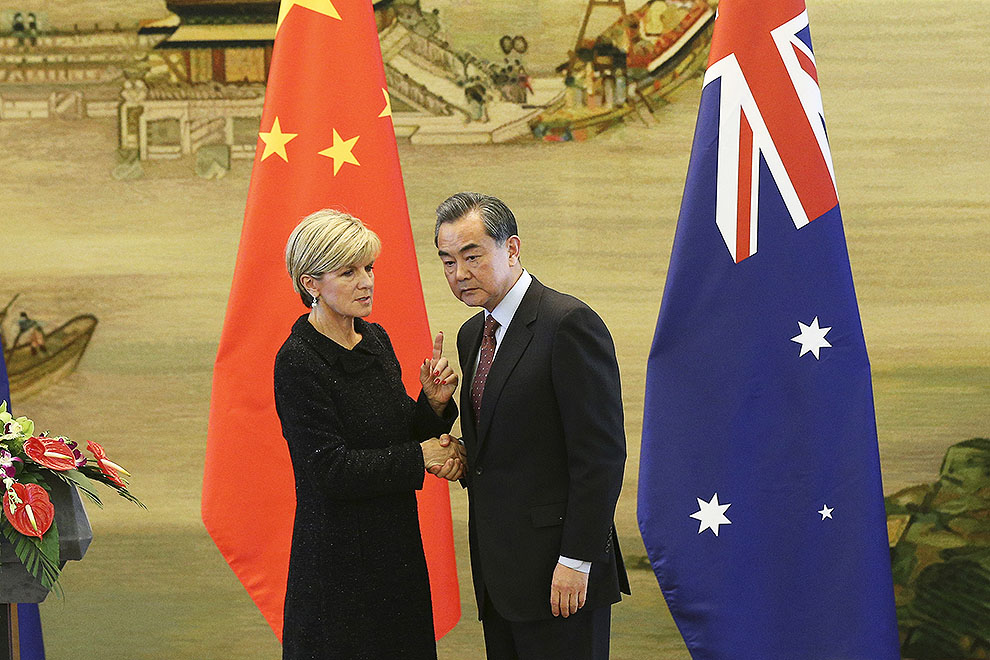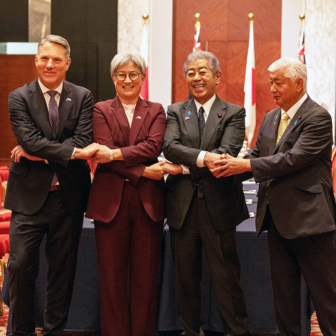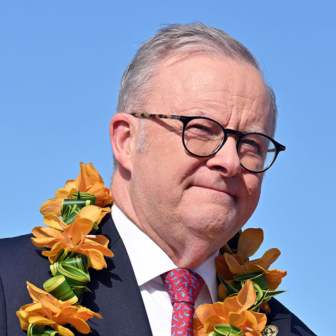The human race avoided nuclear annihilation during the cold war by the skin of its teeth. Now it finds itself facing new and potentially grave geopolitical, social and economic threats in these years of at least partial global peace.
We may, of course, escape the conflagration again. But optimism does not come easily in a world of interacting conflicts around global economic uncertainty; mass refugee migration; rising populist nationalism; spreading Islamist violence; and revived ideological, economic and military competition between Beijing and Moscow and the West.
Clearly the existential threat posed by the cold war’s nuclear stand-off remains remote, but the order now faces significant new security challenges. As Australians endure an interminable federal election campaign, they should be fully aware of these challenges and their consequences, but they are getting little guidance from the glib commentary and staged election campaign reportage on TV and other media outlets. Despite discussions about “border security” and new submarines, global economic and security issues are receiving scant attention as political leaders mouth largely self-serving slogans about ill-defined plans for jobs and growth and fairness.
Hence this cautionary overview. Most voters are aware of the global economic malaise as it affects their prosperity and job security; they are aware of vast, desperate and often tragic refugee movements and of the prejudice against Muslims emerging from those movements and from mass Islamic State slaughter. They know, too, that China is throwing its weight about in the South China Sea and that Australia is undertaking a massive military modernisation spearheaded by the acquisition of twelve new submarines.
But there seems only limited appreciation of how these issues, and their interactions, have the potential to bring turmoil to the world. The prospects are grim but cannot be ignored. So let us briefly enumerate six notably troubling issues facing the world.
First, the global economy continues to perform sluggishly and uncertainly almost a decade after the financial crisis of 2007–08. Debt, austerity, low growth and mass unemployment stalk many parts of the world. Second, huge and often tragic refugee migration flows, mainly from war-ravaged Middle Eastern countries, are challenging the willingness and the capacity of the system and individual countries to deal with and to accept asylum seekers. Third, right-wing populist political movements are rising throughout Europe to oppose these migrant and refugee flows, especially from Muslim countries. Fourth, the murderous Islamic State organisation is slaughtering people wherever it can plant its bombers and gunmen in the world. Fifth, China is emerging as an increasingly aggressive regional presence, especially in the South China Sea. Sixth, Russia is moving to impose imperialistic “Eurasian” economic and strategic policies on its neighbours.
These developments are increasing the risks of global social, economic and even military conflicts, and effective ways are yet to be found to manage what are already dangerous pressures. There is nothing inevitable or preordained about the course of these trends, but there cannot be much doubt that they present what the current cliché would declare a perfect storm of dire possibilities. Add the chances that Britain might exit the European Union next month and that Donald Trump might become president of the United States and you have a recipe for sleepless nights. Then there are the looming threats from the consequences of global warming.
There have been plenty of warnings and increasing evidence of these dangers. Economic pessimists point to grim developments in the neoliberal capitalist world: growth is slow, middle classes are being squeezed, and a few are becoming extremely rich while many more struggle with rising poverty and unemployment. This economic malaise has an especially heavy impact on younger citizens, and is causing deepening internal divisions and resentments in Western societies. Huge debt and externally imposed austerity programs are choking countries like Greece.
At the same time, democracies are facing the external challenge of huge numbers of asylum seekers making for their borders claiming humanitarian relief and a richer, safer life. Often those asylum seekers – especially from Muslim countries – bring religious, social and cultural values that do not sit easily with secular Western values. The refugee numbers are a major political challenge to European governments committed to assisting asylum seekers facing persecution or death at home, and these countries struggle and sometimes fail to maintain the highest standards of human rights protection.
One consequence has been the emergence throughout Europe of populist right-wing political movements opposing Muslim immigration and often echoing fascist ideas and values. They have appeared in countries throughout western and eastern Europe, occasionally winning seats in legislatures, and attracting widespread and growing popular support. It is perhaps not surprising that people concerned about their economic circumstances and future are not inclined to be generous to strangers arriving at their borders, often after horrendous journeys, demanding admission and help.
Rightly or wrongly, such people fear being swamped by a tide of refugees with very different social and cultural traditions. They fear for their jobs and for social cohesion; they fear they will become strangers in their own countries. They are easily seduced by right-wing populist voices of hate and fear. It is easy to be generous and welcoming in prosperous times; it is much tougher in hard times and there is much greater reluctance and resistance.
There have, of course, been many warnings about Europe’s turn towards populism, the latest coming from the former chief of the British foreign intelligence service, MI6, Sir Richard Dearlove. He told the BBC recently, “If Europe cannot act together to persuade a significant majority of its citizens that it can gain control of its migratory crisis then the EU will find itself at the mercy of a populist uprising, which is already stirring.” Barely a week later the right-wing extremist Norbert Hofer came within a whisker of being elected president of Austria, a country that has struggled with asylum seeker arrivals.
Adding to this witches’ brew, the brutal global murder campaign by the Islamic State movement is increasing the hatred directed against Muslims in Western countries. Much anti-Muslim feeling may be irrational and unfair, but it is real and it is easily exploited by the demagogues of the populist right. Pleas for tolerance and understanding may help to counter the voices of hate, but worldwide acts of terror, proselytising by radical Muslim clerics, and the youth recruitment activities of Islamic State agents have prompted widespread hostility towards Muslims in Western societies. Sadly, the moral authority of Christian churches, which should act to oppose such prejudice, has been deeply undermined by disclosures of the sexual abuse of children by some Christian clergy.
Reinforcing these gloomy events are increasingly aggressive and intimidating actions by China and Russia as they seek to shore up and expand their global military power and presence. China’s claims to the South China Sea – evident in, for example, its construction and militarisation of islands, and its aggressive naval confrontations with other regional powers – threaten freedom of navigation and could trigger serious military conflict with dire global economic consequences.
China’s activities in the South China Sea demonstrate that Beijing is an active strategic competitor determined to challenge and to damage Western, particularly US, security and trade interests in the Pacific. It is myopic to view China solely as an important economic partner that buys mineral and energy resources and sells manufactured goods. Australian political leaders cannot safely ignore the economic and security implications of handing China long leases on places like the port of Darwin, vast tracts of agricultural land, and unfettered access to property markets. Western political leaders should not forget that China remains a tightly controlled Leninist state with no respect for democratic values. We have to deal very carefully indeed with the ambitious authoritarians in Beijing and those who support them.
No less concerning is Vladimir Putin’s effort to establish a Eurasian Economic Union embracing Russia and neighbouring countries, in a bid to re-establish Russia as a great power. Putin has already used force twice (in Georgia and Ukraine) to support that view. Apparently well-founded reports suggest that the extremist and apocalyptic Russian academic Alexander Dugin was the geopolitical inspiration for this initiative. Dugin believes that a Russian-ruled Eurasian empire should reach for world domination and his latest writings are based on a famous 1904 essay by British geographer H.J. Mackinder. Mackinder saw what he called the “World-Island” as the geographical pivot of history. It comprised Europe, Asia and Africa. At its centre was the “Heartland” stretching from the Volga to the Yangtze and from the Himalayas to the Arctic. Historically, Russia ruled the Heartland. Mackinder argued: “Who rules East Europe commands the Heartland. Who rules the Heartland commands the World-Island. Who rules the World-Island commands the world.”
If this sort of analysis informs Putin’s current Eurasian rhetoric, then he likely is dreaming of a restored Russian empire in control of the World-Island. This is not some remote issue for Australians: Russia is, after all, a Pacific power.
Australia’s ability to influence events playing out in the world is limited. The national economy is hostage to global forces over which politicians have little control despite their campaign boasts about plans for jobs and growth. Public attitudes have encouraged politicians to qualify the nation’s obligations towards asylum seekers seeking access to Australia. There are no votes in compassion when voters are concerned about jobs and opportunities, even if mealy-mouthed appeals for tolerance are embedded in the political rhetoric of all parties. There are, of course, votes in tough policies to thwart Islamic State activity and recruitment efforts.
At the same time, Australians remain confused about the activities of China and Russia. Australia’s military modernisation suggests an awareness of the need to be prepared for potential perils, but the lure of trade and capital inflows encourages too many to close their eyes to strategic realities. We set aside our commitments to the rules-based order to which the nation and its traditional allies, notably the United States and Britain, profess a bedrock commitment.
There are no simple ways for a nation like Australia to exert a meaningful influence. In the world economy, Australia is a price-taker with a small, if technologically advanced, military that would be no match for nuclear giants. But a few things might be done. First, Australia needs to preserve and defend its alliances (and pray that Donald Trump fails in his bid for the White House and that Britain stays in Europe). Second, it needs to make clear – especially to China – that we and our allies will not be pushed around by burgeoning economic and military might. Third, it needs to defend its commitment to a rules-based order where national self-interest is balanced by due respect for the universal legal and political obligations we undertake under the aegis of the United Nations. Fourth, it needs to find a stable balance between social fairness and economic efficiency, especially in uncertain economic times.
We will not always succeed or come close to success. Australia is still a nation of great economic inequality. Moreover, domestic pressures seem certain to continue to compromise legal and moral obligations to, say, refugees and some religious minorities, most notably Muslims. It is impossible to impose tolerance on the frightened racist and extremist religious groups now challenging national unity and it is impossible to stop politicians from trying to exploit fears and ignorance. But we have to try if we are to have a chance of escaping again by the skin of our teeth and preserving the imperfect democracy we still enjoy from time to time. •




